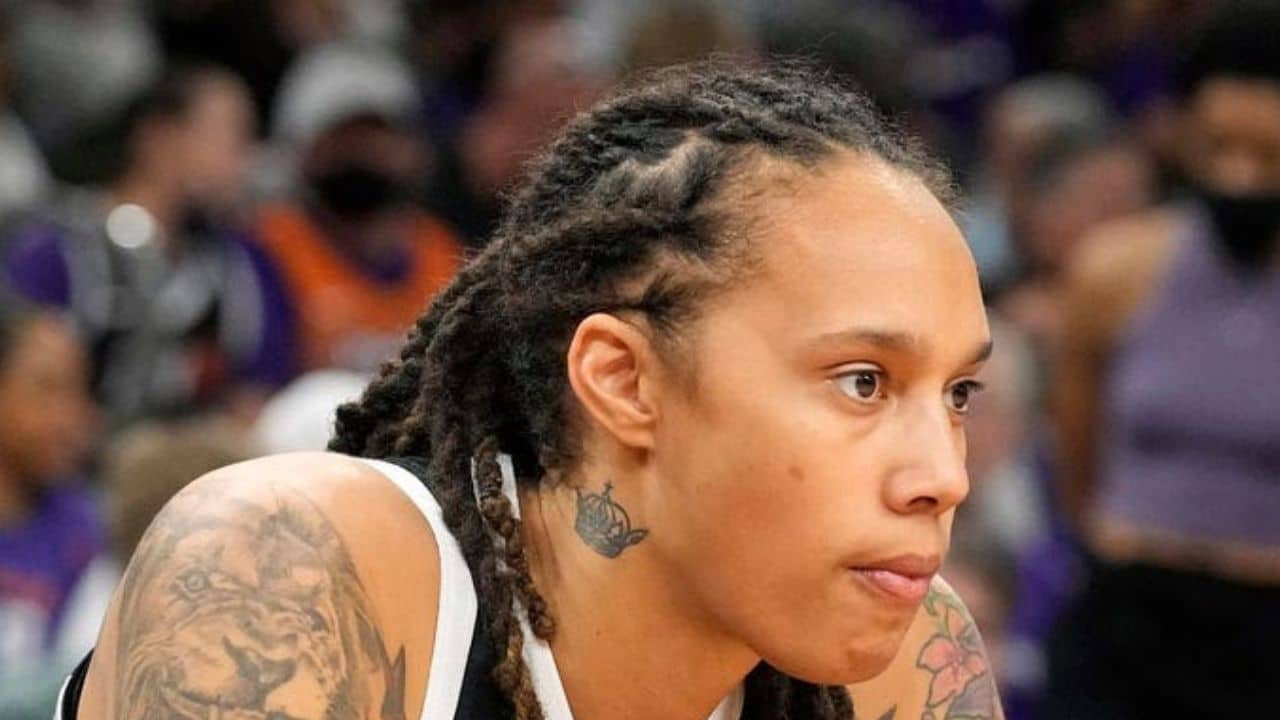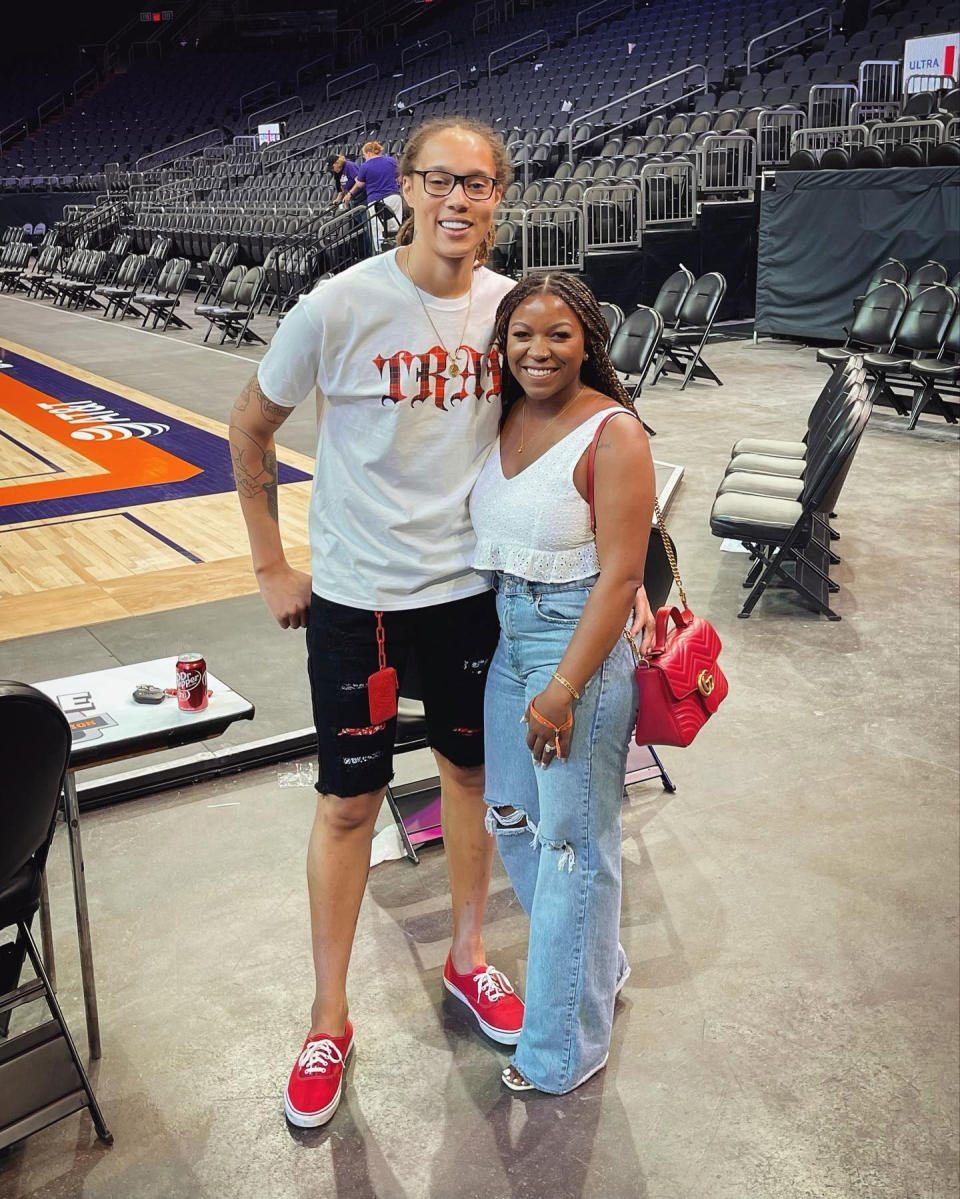Brittney Griner: A Deep Dive Into Her Gender Identity
Brittney Griner is a name that resonates in the world of sports, particularly in women's basketball. Known for her incredible athletic talent and towering height, Griner has garnered attention not just for her skills on the court but also for her identity. Her journey has sparked conversations around gender, representation, and societal norms, leading many to inquire about Brittney Griner's gender. Understanding Griner's gender identity is essential for recognizing the broader implications of her visibility and influence in sports and beyond.
As an openly gay athlete, Brittney Griner has navigated challenges unique to her gender identity and sexual orientation. She has openly discussed her experiences, shedding light on the struggles and triumphs faced by LGBTQ+ individuals in the public eye. The curiosity surrounding Brittney Griner's gender also ties into a larger conversation about how society perceives gender, particularly for those who do not fit traditional molds. In a world where gender fluidity is becoming more acknowledged, Griner represents a significant figure in this evolving dialogue.
In addition to her athletic prowess, Brittney Griner's gender identity has contributed to her role as an activist and advocate for LGBTQ+ rights. By being unapologetically herself, she inspires many to embrace their true selves while challenging the stereotypes and biases prevalent in sports and society. This article aims to explore Brittney Griner's gender identity, her life, and her impact on the world as a prominent figure in sports.
- Uncovering The Secrets What Did Aubreigh Wyatt Notes Say
- A Heartfelt Farewell Aubreigh Wyatt Goodbye Notes
What is Brittney Griner's Biography?
Brittney Griner was born on October 18, 1990, in Houston, Texas. She attended Nimitz High School, where she quickly gained recognition for her exceptional basketball skills. Griner went on to play college basketball at Baylor University, where she achieved remarkable success, including leading her team to a national championship in 2012. Her athletic career continued to flourish in the WNBA, where she was drafted first overall by the Phoenix Mercury in 2013. Griner's contributions to the game have earned her numerous accolades, including multiple All-Star selections and Olympic gold medals.
| Personal Details | Bio Data |
|---|---|
| Name | Brittney Griner |
| Date of Birth | October 18, 1990 |
| Place of Birth | Houston, Texas |
| Height | 6 ft 9 in (2.06 m) |
| College | Baylor University |
| WNBA Team | Phoenix Mercury |
| Position | Center |
| Olympic Achievements | Gold Medals (2016, 2021) |
How Does Brittney Griner Identify Gender-Wise?
Brittney Griner identifies as a lesbian and has openly discussed her experiences in the LGBTQ+ community. Her visibility as a gay athlete has played a significant role in challenging stereotypes and promoting inclusivity within sports. Griner's gender identity has influenced her personal life and has also made her a prominent figure in discussions about gender and representation in athletics.
What Challenges Has Brittney Griner Faced Due to Her Gender Identity?
Throughout her career, Brittney Griner has encountered various challenges related to her gender and sexual orientation. Some of these challenges include:
- Unraveling The Mystery When Is Sherri Papinis Birthday
- Mkv Moviespoint Your Ultimate Destination For Highquality Movie Downloads
- Facing discrimination and prejudice from fans and fellow athletes.
- Dealing with media scrutiny regarding her appearance and identity.
- Being a target of homophobic remarks and attitudes.
- Navigating the complexities of being a public figure in the LGBTQ+ community.
Despite these challenges, Griner has remained resilient, using her platform to advocate for change and speak out against injustice. Her courage has inspired many, making her a role model for not just athletes, but individuals across various walks of life.
What Impact Has Brittney Griner Made on Gender Representation in Sports?
Brittney Griner's impact on gender representation in sports is profound. By being open about her sexual orientation, she has contributed to a shift in how gender and sexuality are perceived within athletics. Some key aspects of her impact include:
- Encouraging other athletes to come out and embrace their identities.
- Raising awareness about the challenges faced by LGBTQ+ athletes.
- Highlighting the importance of inclusivity and acceptance in sports.
- Promoting conversations about gender identity and fluidity.
Griner's influence extends beyond the basketball court, as she has become an emblem of hope for many individuals grappling with their own identities. Her courage to live authentically serves as a beacon of inspiration for future generations.
How Has Brittney Griner Used Her Platform for Advocacy?
Throughout her career, Brittney Griner has leveraged her platform to advocate for various social issues, particularly those related to the LGBTQ+ community. Some of her notable advocacy efforts include:
- Participating in campaigns that support LGBTQ+ rights.
- Speaking at events to raise awareness about discrimination in sports.
- Collaborating with organizations that promote inclusivity and acceptance.
- Using her social media presence to amplify marginalized voices.
Griner's commitment to advocacy showcases her desire to create a more equitable world for all individuals, regardless of their gender or sexual orientation.
What Role Does Media Play in Shaping Perceptions of Brittney Griner's Gender?
The media plays a crucial role in shaping public perceptions of athletes, and Brittney Griner's gender identity is no exception. Coverage of Griner has often focused on her height, athletic achievements, and personal life, which can both positively and negatively impact how audiences view her. The portrayal of Griner in the media can influence societal attitudes towards gender and sexuality, with both supportive and critical narratives present. It is essential for media outlets to handle such topics thoughtfully to foster understanding and acceptance.
How Is Brittney Griner's Gender Perceived in Different Cultures?
Perceptions of Brittney Griner's gender can vary significantly across cultures. In some societies, her identity may be embraced and celebrated, while in others, it may be met with resistance or discrimination. The following factors contribute to these varying perceptions:
- Societal norms and expectations regarding gender roles.
- Cultural attitudes towards LGBTQ+ individuals.
- Religious beliefs that may influence perceptions of gender.
- Media representation and visibility of LGBTQ+ figures in different regions.
Understanding these cultural contexts is crucial in recognizing the challenges and opportunities faced by athletes like Brittney Griner as they navigate their identities on a global stage.
Conclusion: What Can We Learn from Brittney Griner's Journey?
Brittney Griner's journey as an athlete and an advocate for LGBTQ+ rights underscores the importance of authenticity and representation in sports. Her openness about her gender identity has not only paved the way for discussions about gender and sexuality but has also inspired countless individuals to embrace their true selves. As society continues to evolve, the stories of athletes like Brittney Griner remind us of the power of courage and the impact of standing up for one's identity. In celebrating Brittney Griner's gender and her journey, we are reminded of the importance of inclusivity, acceptance, and the ongoing fight for equality.
Article Recommendations
- Unraveling The Mystery Is Molly Noblitt Still Alive In 2024
- Exploring The World Of Mk Movie Point Your Ultimate Film Guide



Detail Author:
- Name : Tanya Schmeler
- Username : nona76
- Email : deckow.lenna@jacobs.com
- Birthdate : 1991-04-13
- Address : 9599 Rutherford Lock Suite 355 Schimmelside, CA 45747-4752
- Phone : 951-787-5517
- Company : Abbott PLC
- Job : Shipping and Receiving Clerk
- Bio : Blanditiis magni sit nam repellendus et. Consequuntur assumenda ex aspernatur id deserunt. Aut id reiciendis quidem veniam. Commodi modi ipsam explicabo et accusantium. Commodi minus odit ea eum.
Socials
linkedin:
- url : https://linkedin.com/in/gustave6048
- username : gustave6048
- bio : Ea quas est facilis earum.
- followers : 2825
- following : 1850
facebook:
- url : https://facebook.com/go'conner
- username : go'conner
- bio : Ut minus ea numquam eum.
- followers : 6546
- following : 1807
twitter:
- url : https://twitter.com/gustave.o'conner
- username : gustave.o'conner
- bio : Porro perferendis enim fugit occaecati eum repudiandae. Vel reprehenderit labore fuga et.
- followers : 3730
- following : 988
tiktok:
- url : https://tiktok.com/@gustaveo'conner
- username : gustaveo'conner
- bio : Dolor cum omnis animi est. Rem itaque culpa magnam aliquam aspernatur nemo.
- followers : 6341
- following : 633
instagram:
- url : https://instagram.com/gustave_official
- username : gustave_official
- bio : Eius dolor est aut iusto officiis. Commodi neque labore dolorum aperiam molestiae.
- followers : 6193
- following : 1526